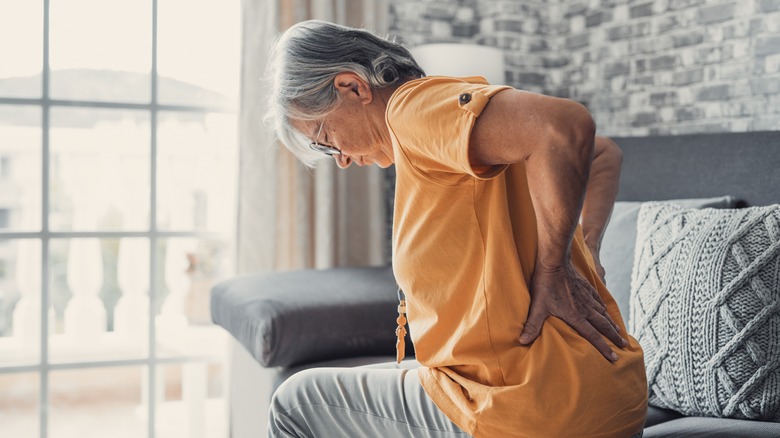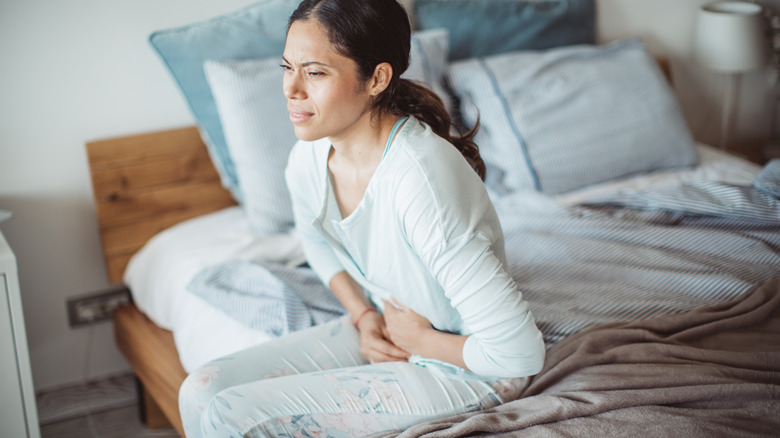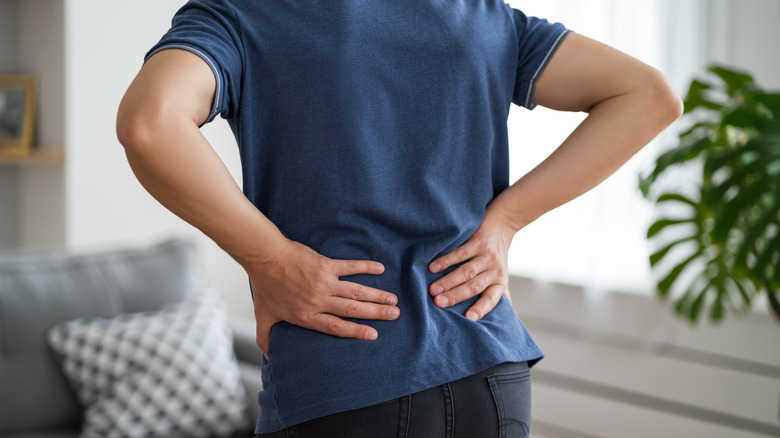Why You're Experiencing Back Pain After Eating
You've been feeling back pain — strangely enough, after eating lunch or dinner. While most people attribute back pain to a pulled muscle, disc problem, or specific bone injury, back pain can be a symptom of various conditions. And if the only clue you have to what's causing it is that you just ate a meal, you may be even more perplexed.
In many cases, what caused the back pain comes down to what you ate. Specific gastrointestinal conditions can lead to radiating pain in your upper back, especially accompanied by indigestion and bloating. This type of pain might also be caused by food intolerance or poor posture. Pain in the back can also be a sign of a more dire medical condition like a kidney infection, pancreatitis, or a heart attack.
Keep yourself informed by exploring the different medical conditions and their symptoms that can cause back pain after eating. Dig into remedies that will prevent these conditions in the first place and keep you pain-free.
Gastrointestinal pain radiates to back
You didn't have any issues eating that steak and potatoes. But a half hour later, your back is killing you. While most people think of indigestion as causing stomach pains, bloating, and gas, it can also cause pain that radiates to your back. Typically, three common gastrointestinal issues are to blame for the irritating ache in your upper and middle back.
Starting in the esophagus, gastroesophageal reflux disease (GERD) is a common disorder where your stomach acid and contents move up into your esophagus, creating burning in your throat, heartburn, and chest pain that radiates to the back (via John Hopkins Medicine). You might also have an open sore in your stomach lining called a peptic ulcer. This can lead to symptoms like a burning stomach, radiating back pain, and heartburn. Gallbladder issues, like stones and disease, can lead to a blockage or inflammation, causing you to feel stomach pain on the right side, nausea, and indigestion (via Cleveland Clinic).
In many cases, pain from gallbladder issues, GERD, and ulcers are brought about by what you eat. Avoid food triggers like high-cholesterol foods, spicy foods, caffeine, and alcohol, and be sure to take any prescribed medications, according to Healthline. But gastrointestinal issues are just one cause of back pain. Your food allergy or intolerance might also be to blame.
Food allergies and intolerances aggravate back pain
Stomach pains, rashes, and indigestion are common when you accidentally consume foods you are intolerant to. You might even experience more serious allergic reactions, like anaphylaxis, that require emergency medical intervention. However, most people don't associate food intolerances with back pain.
One of the main reasons that a food allergy and food intolerance could cause back pain is indigestion that radiates to the back—for example, consuming lactose when lactose intolerant can lead to indigestion, bloating, and back pain, since your body cannot process it, according to UNC Health Talk. Food allergies and intolerances can also cause inflammation in the body, specifically in your back and joints. The Celiac MD showed there is an association between eating gluten and back pain. Additionally, a 2020 study in Medical Hypotheses highlighted that lower back pain improved in gluten-intolerant patients by eating a gluten-free diet.
Avoiding allergy and intolerance-related food pain requires you to quit eating the food causing the issues. You might need to see your doctor for a food allergy test or buy a kit online to help narrow down the problem. This is especially true if you notice that certain foods lead to a reaction like dairy or wheat. While food is a common link to back pain after eating, there are other conditions to consider — like a kidney infection.
Lower to mid back pain with kidney infections
The food you eat is typically a trigger for back pain, especially if you've had a big meal. But the pain isn't always dependent on the food. It can just be a matter of filling your stomach with food and drinks that can cause back pain. This is especially true in the case of a kidney infection.
This rather unpleasant condition is caused by bacteria in your bladder. According to NHS Inform, it sneaks its way into your kidneys, wreaking havoc on this delicate system. Kidney infections can cause indigestion, stomachache, and lower back pain, but they have additional symptoms of fever, fatigue, and painful urination. Women are more at risk for developing a kidney infection. Treatment typically involves a round of antibiotics to knock the infection out of your system and avoid complications. See your healthcare specialist if you suspect this condition.
Kidney infections can leave you feeling rather miserable. However, suffering from pain and fever is not inevitable. Several ways to prevent infection include keeping your body hydrated, not holding your urine, treating urinary tract infections immediately, wiping from front to back, and using good hygiene (via Byram Healthcare). If your pain is more in your upper back, however, how you sit when you eat could be the issue.
Upper back pain from poor posture
You'd think the key to back pain and eating would be the eating part, but it could also be the sitting part. Your posture can significantly affect the aches and pains you feel.
The most common kind of poor posture during eating is slouching over your plate to eat. This is common if you're sitting on the couch or at your computer to eat your food. According to the American Pain Institute, this is commonly known as tech neck, since it's also the posture many of us adopt while using our laptops and cell phones. It's where your neck is pushed forward of your shoulders. This can result in pain that starts in the neck and works its way down the shoulders and into the back. This is doubly true if you maintain this posture while working on your computer after your lunch break.
It's hard to get out of the habit of poor posture, but it can easily be treated without healthcare intervention (for the most part). In addition to ensuring you get up and move regularly, try a few exercises if you have bad posture. For example, you might use child's pose to lengthen your spine and stretch the muscles. Poor posture is a relatively easy fix for back pain. However, other conditions with back pain after eating can be life-threatening without immediate medical care.
Serious conditions to watch out for
A few severe conditions, like pancreatitis and heart attack, should not be ignored when you have back pain after a meal. Pancreatitis is an inflammation of your pancreas and can lead to severe complications when left untreated. It typically starts as stomach pain and moves to the back. Severe pancreatitis can be life-threatening, so it's essential to see your healthcare provider if you experience pain, especially if it comes with changes in your bowel habits and weight (via Cleveland Clinic).
Back pain is a lesser-known symptom of a heart attack, which is a medical emergency. The pain can be felt in the upper back and radiate to the shoulder or jaw, or it might feel like tightness around your upper back, according to Medical News Today. It can also present with indigestion, nausea, and upper abdominal pain, making it harder to distinguish. These symptoms are more common in women than men. If you have these or other heart attack symptoms, like fatigue, sweating, arm pain, and chest pain, seek emergency medical care.
Getting back pain after you eat at your favorite restaurant can be a bit uncomfortable, and may come from a lot of different sources. It's always best to check with your healthcare specialist to determine a course of action to treat this painful condition.






